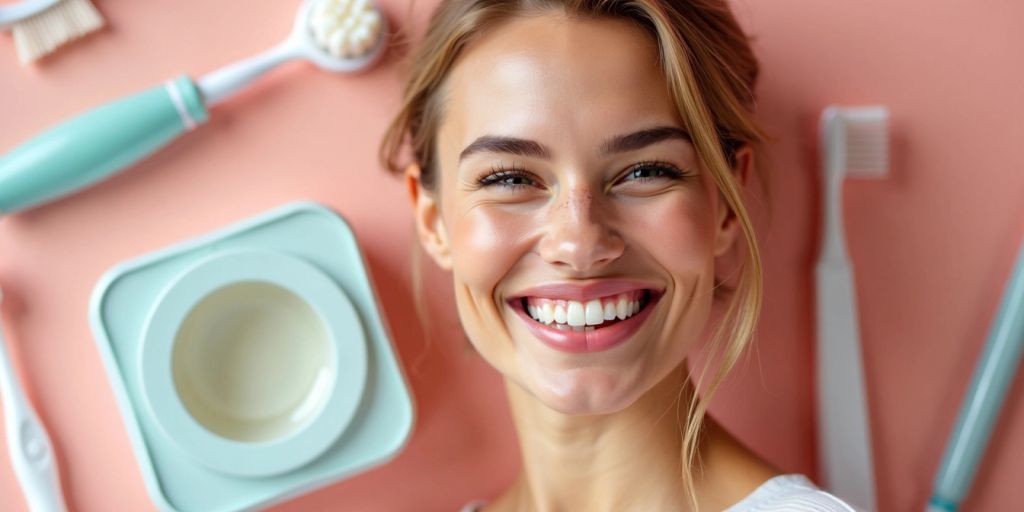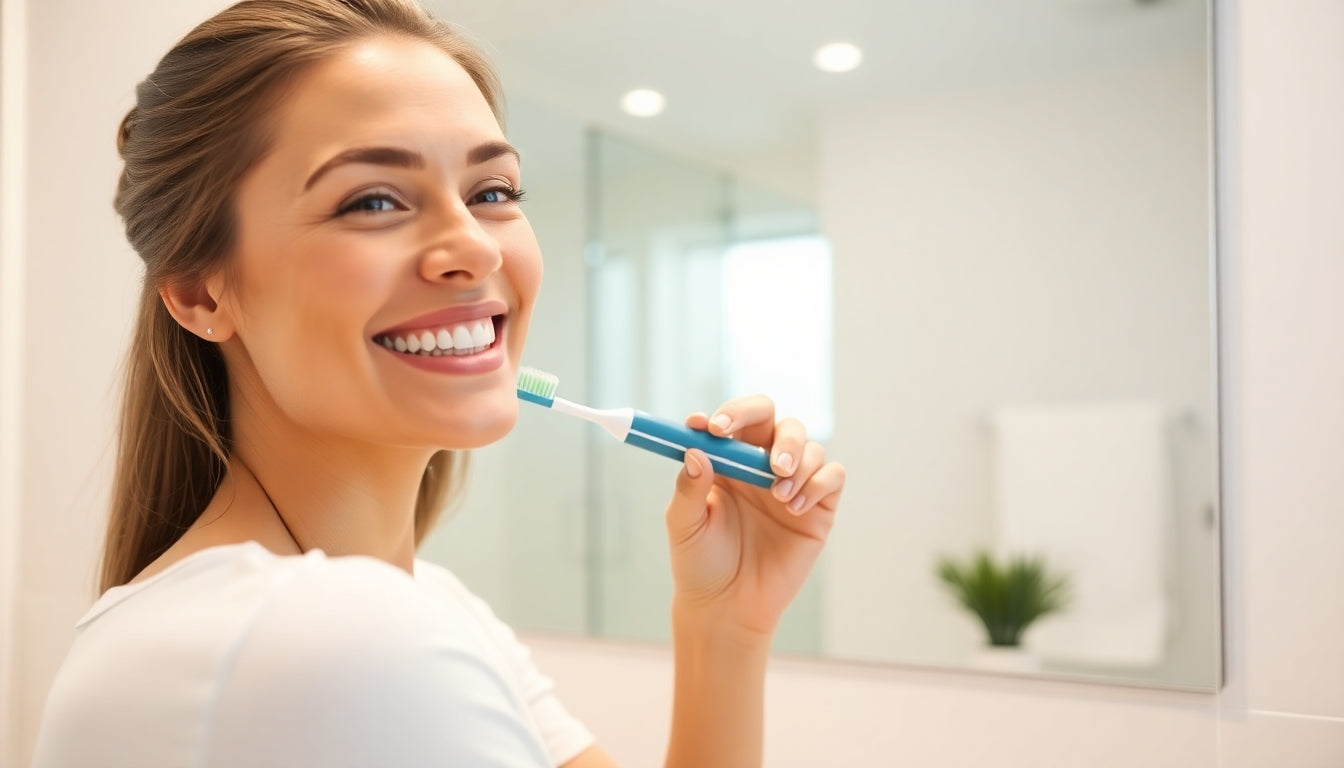Bad breath after brushing your teeth: causes and tips
Everyone knows the feeling: you have just brushed your teeth and rinsed your mouth with mouthwash and yet you still have bad breath. This can be an uncomfortable and embarrassing problem, especially when socializing. However, there are many ways to get rid of bad breath and regain confidence.
Why does bad breath occur after brushing your teeth?
Bad breath after brushing your teeth can occur for a variety of reasons. One of the most common reasons is poor oral hygiene. If you don't brush your teeth regularly, bacteria can build up in your mouth and cause unpleasant odors.
Another reason for bad breath after brushing your teeth can be diet. Certain foods, such as onions or garlic, can cause an unpleasant odor in the mouth. Smoking and drinking alcohol can also lead to bad breath.
A commonly overlooked cause of bad breath is dry mouth. If the mouth does not produce enough saliva, bacteria can multiply in the mouth and lead to an unpleasant odor.
How can sonic toothbrushes help?
A sonic toothbrush can help fight bad breath. Compared to traditional toothbrushes, a sonic toothbrush can be more effective at removing bacteria and plaque. Due to their rapid vibration movement and sound waves, they can also reach deeper into the interdental spaces and thus contribute to better cleaning.
There are many different brands and models of sonic toothbrushes on the market, each offering different features and settings. It is important to choose a toothbrush that suits individual needs and ensures effective cleaning.
Tips to fight bad breath
Regular teeth cleaning: Regular tooth brushing is essential to combat bad breath. It is recommended to brush your teeth twice a day for at least two minutes. You can also use dental floss to clean between your teeth.
Mouthwash: A mouthwash can help fight bacteria and freshen breath. However, it's important to choose a mouthwash that doesn't contain too much alcohol, as alcohol can dry out your mouth and cause bad breath.
Staying hydrated: Staying hydrated is important to keep your mouth moist and encourage saliva production.
Proper nutrition: Eating a balanced diet can help prevent bad breath. Certain foods such as onions or garlic should not be eaten before important appointments or activities. There are also some natural remedies that can help fight bad breath. For example, parsley can help freshen breath by containing chlorophyll, which can absorb unpleasant odors. Ginger, cinnamon and cloves can also promote fresh breath and fight bad breath.
It's important to note that bad breath can also be a sign of more serious medical problems, such as gastrointestinal problems, diabetes, or liver disease. If the problem persists despite regular oral hygiene and other measures to control bad breath, it is advisable to see a doctor to rule out a possible underlying condition.
In summary, bad breath after brushing your teeth is an unpleasant problem for many people. However, there are a variety of measures that can help freshen breath and combat bad breath. Regular oral hygiene, a balanced diet, adequate fluid intake, and avoiding tobacco products and alcohol can help keep your breath fresh. Electric toothbrushes and mouthwashes can also be helpful in reducing bad breath. However, if the problem persists despite all measures, it is advisable to consult a doctor to rule out a possible underlying medical condition.
How do you politely address a person with bad breath?
It can be difficult and uncomfortable to point out to someone that he or she has bad breath. But it's important to do it to help the person and create a comfortable atmosphere for everyone. Here are some tips on how to be nice and polite:
-
Choose the right time: Choose a suitable time and place to bring up the topic. Avoid embarrassing or public situations.
-
Be honest and direct: Tell the person gently but directly that you've noticed they have bad breath and that sometimes it makes you uncomfortable.
-
Offer Help: Offer to help the person solve the problem. For example, recommend a specific toothpaste or mouthwash, or suggest that the person see their dentist.
-
Be empathetic: Make sure you are empathetic and respect the person's feelings. Explain that you are not saying it to hurt her, but because you want to help her.
Overall, it is important not to ignore bad breath and to help others solve the problem. If you get on well with the person, they will thank you too. If necessary, you can also try to address the whole thing in a humorous way.
Tips if the child also suffers from bad breath - but maybe doesn't even notice it
Bad breath can occur not only in adults, but also in children. The cause of bad breath in children is often similar to that in adults - poor oral hygiene or certain diseases such as tooth decay or inflammation in the mouth.
It is important for parents to teach their children early on the importance of good oral hygiene. This includes brushing your teeth regularly, using dental floss and cleaning your tongue. Eating a balanced diet and drinking enough water can also help prevent bad breath in children.
Another possible cause of bad breath in children can be their laziness. Children often just don't feel like brushing their teeth or cleaning their tongues. In this case, parents can try to motivate their children through play and explain to them the importance of good oral hygiene.
However, it is important for parents to be sensitive about this and not make their children feel like they smell bad or are unhygienic. A kind and understanding approach can help children become more interested in their oral hygiene and develop awareness of it in the long term.
Frequently asked Questions:
Why do I have bad breath after brushing my teeth?
- Bad breath can occur after brushing your teeth if bacteria in the mouth have not been completely removed or if there is an underlying medical condition.
Can using an electric toothbrush help reduce bad breath?
- Yes, electric toothbrushes can be more effective than traditional toothbrushes at removing bacteria and plaque in the mouth, which can help reduce bad breath.
Can bad breath be a sign of a serious medical condition?
- Yes, bad breath can be a sign of underlying medical problems like gastrointestinal issues, diabetes, or liver disease. If the problem persists despite regular oral hygiene and other measures to combat bad breath, it is advisable to see a doctor.
Final word
Overall, there are many reasons for bad breath after brushing, but there are also many steps one can take to avoid it. Brushing your teeth with a quality toothbrush like the bamtoo sonic toothbrush can be an effective way to remove plaque and bacteria that can cause bad breath. However, it is also important to consider other measures such as tongue cleaning and regular dental visits to achieve optimal oral health.
The bamtoo sonic toothbrush is an excellent choice for those looking for an eco-friendly toothbrush that also offers effective cleaning. By using sonic technology, KOA V2 can also help fight bad breath by thoroughly removing plaque and bacteria, as well as surface stains.
Overall, it's important to understand that bad breath after brushing is a common problem, but there are many steps one can take to avoid it. It is important to maintain a comprehensive oral hygiene routine and consider regular dental visits. With a little effort and care, one can enjoy fresh and comfortable breath and maintain healthy oral hygiene.





